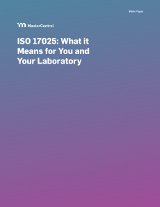
GxP Lifeline
New FDA Lab Test Regulations: A Breakdown and Why Compliance Software Is Your New Best Friend

In an effort to boost the public’s assurance of the safety and effectiveness of in vitro diagnostic products (IVDs) offered as laboratory developed tests (LDTs), the U.S. Food and Drug Administration (FDA) has issued a final rule amending the regulations that apply to these types of products. Historically, regulation of LDTs has fallen to the Centers for Medicare and Medicaid Services (CMS) rather than the FDA because they have largely been viewed as low-risk, low-volume products. In a phased approach over the next four years, however, IVD products that were not previously considered medical devices will be subject to FDA regulation of laboratory developed tests.
Analysis of the New FDA Compliance Requirements for LDTs
The final rule, which goes into effect July 5, 2024, amends FDA compliance requirements to make explicit that LDTs offered as IVDs are considered medical devices under the Federal Food, Drug, and Cosmetic (FD&C) Act, including when the manufacturer of the IVD is a laboratory. Many in the industry, including the American Clinical Laboratory Association which has sued the FDA in an attempt to halt the new rule, have concerns that the new rule represents federal overreach.1 FDA Commissioner Robert Califf has countered that its specific aim is “to provide crucial oversight of these tests to help ensure that important health care decisions are made based on test results that patients and health care providers can trust.”2
The FDA will begin phasing out the “enforcement discretion” historically exercised for LDTs offered as IVDs in five stages. The following is a breakdown of each stage and their respective effective dates:
Stage 1 – May 2025: LDT makers will be subject to the new FDA compliance enforcement discretion policies for:
- Medical device reporting (MDR).
- Correction and removal reporting.
- Quality systems for maintaining complaint records.
Stage 2 – May 2026: The FDA compliance scope will be expanded to include:
- Investigational use.
- Labeling.
- Registration and listing requirements.
Stage 3 – May 2027: LDT makers will be beholden to the remainder of the quality system requirements found in 21 CFR Part 820 beyond what’s already required in the first two stages. It’s vital to note, however, that the FDA’s updated Quality Management System Regulation (QMSR) will go into effect on February 2, 2026, a year before Stage 3 of the transition to the LDT final rule begins. Therefore, LDTs will need to be in compliance with the QMSR, not the current Quality System Regulation, and will be subject to audits under the yet-to-be-defined new inspection program, whatever that may entail.
Stage 4 – November 2027: Test makers must comply with premarket review requirements for high-risk IVDs offered as LDTs. According to the Regulatory Affairs Professionals Society (RAPS), the FDA intends to exercise enforcement discretion for test makers who have completed premarket submissions by the beginning of Stage 4 for the duration of the submission review period.3
Stage 5 – May 2028: Enforcement discretion for premarket review for moderate-risk and low-risk IVDs that require a premarket submission ends. Regarding premarket submissions, the FDA’s same enforcement discretion applicable in Stage 4 will also apply in this stage.
What LDT Regulation Enforcement Will Mean
Since there are many different types and varying complexities of LDTs, it stands to reason that the policy will be enforced differently for different types of tests. Because manufacturers of individual components and the laboratories developing tests may be subject to different aspects of enforcement, it’s vital to delve into the rule’s specifics to understand how it applies to your organization’s products and any manufacturing partners you may contract with.
According to industry analysts like Agency IQ, FDA regulation of laboratory developed tests will not only bring big changes to many laboratories that may be unfamiliar with FDA compliance requirements, it is also likely to have major impacts on the development of personalized medicines and other drugs as well as on clinical trials and clinical research.4
Benefits of FDA Compliance and Risks of Noncompliance
While adjusting to the FDA compliance requirements may seem like an uphill battle for LDT developers unaccustomed to such stringent guidelines, adhering to them brings many benefits, including:
- Higher quality lab tests.
- Improved market access and credibility for the developer.
- Enhanced patient safety.
Noncompliance, however, comes with its own set of hazards, such as:
- Reputation damage.
- Financial penalties.
- Legal repercussions.
How Lab Compliance Management Software Addresses the New Requirements
The most important steps an organization can take to align with the new LDT or any other FDA compliance requirements are to:
- Ensure that all systems in use and data are connected throughout the entire life cycle of the product.
- Eliminate paper and as many manual, error-prone processes as possible.
Using a fully connected, fully digitized lab compliance management software solution can empower you to achieve those gains. Purpose-built lab compliance management software provides the assurance that data stays connected and up to date in every phase of development. It also unites the processes involved in document control, change control, training, corrective action/preventive action (CAPA), and other product quality-related activities together within a single platform.
Surviving regulatory changes is much easier when you’re equipped with tools that have been designed to help you rise to the challenge. Contact a MasterControl specialist today to find out how modern lab compliance management software can relieve your FDA compliance burdens.
References:
- “Lab industry sues to stop FDA’s new LDT rule,” Susan Kelly, MedTech Dive, May 30, 2024.
- “FDA Takes Action Aimed at Helping to Ensure the Safety and Effectiveness of Laboratory Developed Tests,” FDA News Release, April 29, 2024.
- “FDA issues long-awaited LDT final rule,” Michael Mezher, RAPS Regulatory Focus, April 29, 2024.
- “How FDA’s Laboratory Developed Test rule could delay some drug approvals,” Laura Diangelo, Agency IQ, May 14, 2024.

